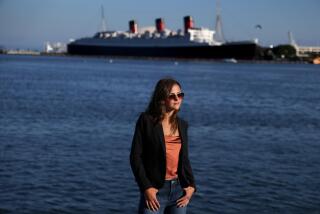Students Truly Touched By Spill : Education: The sand was the playground, until last week. Now the teachers at Newport Beach Elementary are hoping their students won’t forget what they’re seeing.
- Share via
NEWPORT BEACH — Fifth-grade teacher Frank Vaiuso’s science lesson began Wednesday at the edge of the Newport Beach Elementary School playground, where the sand meets the waves.
There, while brown foam washed ashore and a yellow-slickered cleanup crew made its way along the beach, Vaiuso showed his 27 students how oil from last week’s tanker spill was breaking up--”getting chewed up by the waves.”
As the children leaned into the wind, craning for a closer look, some of them pronounced the spill “nasty,” “dirty” and “really, really gross.” Morgan Wooley, 11, took Polaroid pictures for Soundings, the school newspaper.
The spill made them “sad,” Morgan and many of her classmates said. They were upset that birds and fish were dying and “mad” at the oil company that did it.
“There are strong feelings about this,” Vaiuso explained as he led his class back inside. “The beach is their back yard. And now, because of the spill, they’re restricted from going there.”
The children of Newport Beach Elementary attend what is perhaps the nation’s only public school on a beach--located on a wide swath of sand just south of the Newport Pier.
Their asphalt playground ends about 50 feet from the ocean. From their classroom windows, they can watch as whales spout, pelicans dive for fish and porpoises play in the waves. And when
school is out, many of them not only play on the beach but also swim and surf.
So when the Feb. 7 tanker spill dumped nearly 400,000 gallons of crude oil into the ocean, the children were alarmed. And as winds and tides pushed the muck from Huntington Beach to Newport--by Monday, directly behind their school--many students took it as a personal affront.
Teachers, meanwhile, seized on the situation as an opportunity for firsthand environmental education. They’ve assigned essays on the oil spill, taken students on field trips to watch the cleanup and led class discussions on the subject.
“We’d be fools not to take advantage of this,” said third-grade teacher Jean Rocchio, who last week took her students to the Newport Pier, where some of the thickest oil was washing ashore.
Vaiuso agreed. Also, he said, he believes it’s important that the students write and talk about the accident.
“The most important thing is that they get a chance to express their feelings,” he said. “Hardly anybody ever asks the kids what they think. But some of these kids are really hurt by this. Other kids have great soccer fields to play on after school. These kids have the beach.”
When the tanker American Trader ruptured last week, Rocchio was concluding a lesson on “people who made a difference.” That included a look at such important figures as Albert Einstein, Benjamin Franklin and Mother Teresa.
But Wednesday Rocchio asked her students to consider ways that they could make a difference. “How can you make a difference on Earth?” Rocchio asked them. “How can you can help our environment” and prevent another oil spill?
“I think we should stop polluting and help the ocean by stopping using cars so much and walking instead,” suggested third-grader Renee Polestra.
Added classmate Alex Dulian, “You shouldn’t use powerboats as much as sailboats.”
Charlie Boukather, another classmate, chimed in: “I think we always should have double-bottomed tankers--and they should not always go close to the coast.”
Although Congress is still debating the merits of double hulls, many of Newport Beach Elementary’s students have boned up on the issue and vigorously endorse their use.
“They should make it law to have double hulls,” said Scott Simms, one of Vaiuso’s fifth-graders. Added classmate Eddie Truxton, “They could prevent spills if they could double-layer the oil tankers--and make the anchor heavier.”
Newport Elementary’s students had some other suggestions for averting or containing spills. Fifth-grader Ben Pollack said he would “like to invent a nontoxic powder to evaporate the oil.”
Sixth-grader Cameron Boubolious recommended that oil companies abandon tankers and instead build “a train sort of thing” to carry the oil over the ocean.
And several of sixth-grade teacher Ralph Whitford’s students suggested that Californians should reduce their dependence on oil by using solar-powered cars.
“These are tough decisions, folks,” Whitford counseled. “You can use nuclear power. But ‘no nukes,’ right? Solar power? Wind power? You guys are going to have to figure it out.”
Whitford didn’t add--”when you grow up.” But that was understood.
As his students headed for lunch, Whitford said that many of them were coming to grips with an environmental disaster that they had never imagined could happen to them or their beach.
Most of them “have never considered anything like this,” he said. “But in five or six years, when they’re voters, you can be sure it will be imprinted on their minds.”
More to Read
Sign up for Essential California
The most important California stories and recommendations in your inbox every morning.
You may occasionally receive promotional content from the Los Angeles Times.













